- Home
- Roddy Doyle
Paddy Clarke Ha Ha Ha Page 21
Paddy Clarke Ha Ha Ha Read online
Page 21
I didn’t understand. She was lovely. He was nice. They had four children. I was one of them, the oldest. The man of the house when my da wasn’t there. She held onto us for longer, gripped us and looked over us at the floor or the ceiling. She didn’t notice me trying to push away; I was too old for that. In front of Sinbad. I still loved her smell. But she wasn’t cuddling us; she was hanging on to us.
He waited before he answered, always he did, pretended he hadn’t heard anything. She was always the one that tried to make them talk. He’d answer just when I thought she’d have to ask again, to change her voice, make it sound angry. It was agony waiting for him.
—Paddy?
—What?
—Did you not hear me?
—Hear what?
—You heard me.
—Heard what?
She stopped. We were listening; she saw us. He thought he’d won; I thought he did.
—Sinbad?
He didn’t answer. He wasn’t asleep though; I knew the breathing.
—Sinbad.
I could hear him listening. I didn’t move. I didn’t want him to think that I was going to get him.
—Sinbad?—Francis.
—What?
I thought of something.
—Do you not like being called Sinbad?
—No.
—Okay.
I said nothing for a bit. I heard him change, move nearer the wall.
—Francis?
—What?
—Can you hear them?
He didn’t give an answer.
—Can you hear them? Francis?
—Yeah.
That was all. I knew he wouldn’t say any more. We listened to the sharp mumbles coming up from downstairs. We did, not just me. We listened for a long time. The silences were worst, waiting for it to start again, or louder. A door sort of slammed; the back door—I heard the glass shake.
—Francis?
—What?
—That’s what it’s like every night.
He said nothing.
—It’s like that every night, I said.
Breath came out sharp between his lips. He did that a lot since his lips had been burnt.
—It’s only talking, he said.
—It’s not.
—It is.
—It’s not; they’re shouting.
—No, they aren’t.
—They are, I said. -Quietly.
I listened for proof. There was nothing.
—They’ve stopped, he said.—They weren’t.
He sounded happy and nervous.
—They’ll do it again tomorrow.
—No, they won’t, he said.—They were only talking, about things.
I watched him putting on his trousers. He always brought the zip up before he did the button at the top and it took him ages, but his face never changed. He stared down at his hands and made two chins. And he forgot about his shirt and his vest, so he had to do it all over again. I wanted to go over and help him, but I didn’t. One move and he’d change; he’d back away, turn sideways and moan.
—The button should be first, I told him.—At the top. Do it first.
I just said it in a normal voice.
He kept doing what he’d been doing. The radio downstairs sounded nice; the voices.
—Francis, I said.
He had to look at me. I was going to look after him.
—Francis.
He held the two sides of the front of his trousers.
—Why are you calling me Francis? he said.
—Cos Francis is your name, I said.
His face said nothing.
—It’s your real name, I said.—You don’t like being called Sinbad.
He put the sides into one of his hands and did the zip with the other, still the old way. It annoyed me. It was just stupid.
—Sure you don’t? I said.
My voice was still just normal.
—Leave me alone, he said.
—Why? I said.
He said nothing.
I tried a different way.
—Do you not want me to call you Francis?
—Leave me alone, he said.
I gave up.
—Sinnnn-badd—!
—I’ll tell Ma.
—She won’t care, I said.
He said nothing.
—She won’t care, I said again.
I waited for him to say Why not. I was going to get him. He didn’t. He said nothing. He turned sideways and got his trousers done.
I didn’t hit him.
—She won’t care, I said when I was opening the bedroom door. I tried again.
—Francis.
He wouldn’t look at me. He hid himself in his jumper when he was putting it on.
—I kneed you, I said, and I gave him a dead leg.
He collapsed before he understood the pain, straight down like something heavy. I’d done it and seen it done so often it wasn’t funny any more. It was just an excuse; pretending that hurting someone was for a joke. I didn’t even know his name. He was too small to have one. His scream died out once he knew there was nothing else going to happen.
The other one was getting your finger and digging it into someone’s ribs real hard, like a knife, twisting it and saying, Am I boring you? It was new, in school on Monday after the weekend. You couldn’t relax. Your best friend could get you: it was a joke. Or grabbing one of your diddies and saying, Whistle. Some fellas tried to whistle. Sinbad got a pulled diddy and a dead leg at the same time. Everyone got it done to them, except Charles Leavy.
Charles Leavy didn’t do it to anybody. That was weird. Charles Leavy could have made us all line up, like Henno on a Friday morning, and kneed all our legs dead. You wanted to show off in front of Charles Leavy. You wanted to say bad words. You wanted him to look at you the proper way.
They said nothing for long bits but that wasn’t bad; they were watching the television or reading, or my ma was doing a hard bit of knitting. It didn’t make me nervous; their faces were okay.
My ma said a thing during The Virginian.
—What did we see him in before?
My da liked The Virginian. He didn’t pretend he wasn’t watching.
—I think, he said,—I’m not sure; something though.
Sinbad couldn’t say Virginian properly. He didn’t know what it meant either, why they called him the Virginian. I did.
—He comes from Virginia.
—That’s right, said my da.—Where do The Dubliners come from, Francis?
—Dublin, said Sinbad.
—Good man.
Da nudged me. I did it back, with my knee against his leg. I was sitting on the floor beside his chair. Ma asked him did he want any tea during the ads. He said No, then he changed his mind and shouted in Yes.
They always talked during The News; they talked about the news. Sometimes it wasn’t really talk, not conversation, just comments.
—Bloody eejit.
—Yes.
I was able to tell when my da was going to call someone a bloody eejit; his chair creaked. It was always a man and he was always saying something to an interviewer.
—Who asked him?
The interviewer had asked him but I knew what my da meant. Sometimes I got there before him.
—Bloody eejit.
—Good man, Patrick.
My ma didn’t mind me saying Bloody when The News was on. The News was boring but sometimes I watched it properly, all of it. I thought that the Americans were fighting gorillas in Vietnam; that was what it sounded like. But it didn’t make any other kind of sense. The Israelis were always fighting the Arabs and the Americans were fighting the gorillas. It was nice that the gorillas had a country of their own, not like the zoo, and the Americans were killing them for it. There were Americans getting killed as well. They were surrounded and the war was nearly over. They had helicopters. Mekong Delta. Demilitarised zone. Tet Offensive. The gorillas in the zoo didn’t look like they�
�d be hard to beat in a war. They were nice and old looking, brainy looking, and their hair was dirty. Their arms were brilliant; I’d have loved arms like that. I’d never been on the roof. Kevin had, and his da had killed him when he found out about it when he got home, and he’d only been on the kitchen roof, the flat bit. I was up for the gorillas even though two of my uncles and aunties lived in America. I’d never seen them. They sent us ten dollars, me and Sinbad, one Christmas. I couldn’t remember what I got with my five dollars.
—I should get seven cos I’m the oldest.
And I couldn’t remember the names of the uncle and auntie who’d sent it, which ones; Brendan and Rita or Sam and Boo. I had seven cousins in America as well. Two of them were called the same as me. I didn’t care though; I was still up for the gorillas. Until I asked.
—Why are the yankees fighting the gorillas?
—What’s that?
—Why are the yankees fighting the gorillas?
—D’you hear this, Mary? Patrick wants to know why the yanks are fighting gorillas.
They didn’t laugh but it was funny, I could tell. I wanted to cry; I’d given something away. I was stupid. I hated being caught, more than anything. I hated it. That was what school was all about, not being caught and watching others getting caught instead. It was alright now though; it wasn’t school. He told me what a guerrilla was. It made sense now.
—Impossible to beat, he said.
I was still up for them, the guerrillas.
It went back to the man in the studio. Charles Mitchell.
—His tie’s crooked, look.
Then it was Richard Nixon.
—There’s a nose, said my da.—Look.
—He’s a better-looking man than some of them.
It didn’t last long. He just shook a few people’s hands. When Charles Mitchell came back his tie was straight. They laughed. I did too. There wasn’t much else; two dead cows and a farmer talking about them. He was angry. I heard the creak.
—Bloody eejit.
There was nothing in any of that, no hints, no edges, no hard voices. It was normal.
—Bedtime, sonny jim.
I didn’t mind. I wanted to go. I wanted to lie awake for a while. I kissed them. He tried to tickle me with his chin. I got away. I let him grab me without him having to get out of his chair. I got away again.
—Do your ma and da have fights?
—No.
—Not fights like thumping and kicking, I said.—Shouting. Giving out to each other.
—Yeah then, said Kevin.—They have them all the time.
—Do they?
—Yeah.
I was glad I’d asked. It had taken me all day to get to it. We’d walked to Dollymount, had a mess - it was freezing - and come home and I hadn’t asked till we were back on Barrytown Road, nearly at the shops.
—Do yours? said Kevin.
—Have fights?
—Yeah.
—No.
—What did you ask for then? They must.
—They don’t, I said.—They have arguments, that’s all; like yours.
—What did you ask me for then?
—My uncle and auntie, I said.—My ma was talking about it to my da. My uncle hit my auntie and she hit him back and she called the guards.
—What did they do?
—They arrested him, I said.—They came for him in a car with a siren.
—Is he in jail?
—No; they let him out. He had to promise that he’d never do it again. On paper. He had to write it down and sign his name under it. And if he ever does it again he has to go to jail for ten years and my boy cousins get sent to Artane and my auntie keeps my girl cousins cos she wouldn’t be able to afford to keep them all.
—What does your uncle look like?
—Big.
—Ten years, said Kevin.
That was as old as us.
—That’s ages for just hitting someone. And what about her? he remembered.—She hit him as well.
—Not hard, I said.
I loved making up stuff; I loved the way the next bit came into my head, it made sense and expanded and I could keep going till I came to the end; it was like being in a race. I always won. I told it the second I made it up, but I believed it, I really did. This was different though. I shouldn’t have asked Kevin in the first place; he was the wrong one. I should have asked Liam. I’d escaped, but Kevin would probably tell his ma now about my uncle and auntie and she’d tell my ma, although they didn’t like each other much; you could tell from the way they kept moving when they met each other on the street or outside the shops, like they were too busy to stop for long, they were in a hurry. She’d tell my ma and then she’d ask me what I’d said to Kevin about my uncle and auntie and I didn’t think I was good enough to get out of that one.
—But why were you talking about mams and dads fighting anyway?
I’d have to run away from home.
I hadn’t named the uncle and auntie. I’d done that, hadn’t named them, on purpose.
—I was only messing with him.
I was thinking of running away anyway.
—Having him on.
I’d spent ages—Henno had gone off to have a chat with another teacher—looking at the map of Ireland.
—Leading him up the garden path.
She’d laugh. She always did when I said things like that. She thought I was brainy because of it.
—I’m leaving you for a few minutes, gentlemen, said Henno.
We loved it when he said that; I could nearly hear it, backs relaxing. Getting ready.
—A few minutes only, said Henno.—I’ll be leaving the door open. And you know all about my famous ears.
—Yes, Sir, said Fluke Cassidy.
He wasn’t messing. If anyone else had said that he’d have got walloped.
Henno went out the door. We waited. He came back to the door and waited. We stayed looking at our books, not looking up to see if he was there. We heard his shoes. They stopped. We heard them again, going away.
—Fuck your famous ears.
We tried not to laugh too loud. It was better that way, trying not to. I laughed more than I usually did; I couldn’t help it. I had to wipe my face. I got my atlas out of my bag. We hadn’t used it much, only for learning the counties of Ireland so far. Offaly was the easiest one to remember because it was the hardest. Dublin was okay just as long as you didn’t mix it up with Louth. With Fermanagh and Tyrone it was hard to remember which was which. I stared at the map of Ireland from the top to the bottom. There was nowhere I wanted to run away to, except maybe some of the islands. I was still going to do it though. You couldn’t run away to an island; you had to sail or swim part of the way. It wasn’t like a game though; there were no rules that you had to stick to. An uncle of mine had run away to Australia.
I opened up the map of the world in the middle of the atlas. There were places right in the middle that I couldn’t read properly because the pages wouldn’t flatten fully for me. There were plenty of other places though.
I was serious.
Henno had said that my eyes were red. He said I hadn’t got enough sleep. Right in front of everybody. He’d given out to me, said he was going to phone my mother and tell her to make sure I was in bed by half-eight every night. Right in front. I was being allowed to watch too much television.
He bent down closer to my face.
—Were you drunk last night, Mister Clarke?
For a laugh.
We didn’t have a phone but I didn’t tell him that.
My uncle had gone to Australia, by himself. He hadn’t run away, but he’d been very young, still not eighteen. He was still there. He had his own business and a boat.
I’d stayed awake all night. That was why my ma’d said that my face was white and Henno’d said that my eyes were red. I’d kept myself awake; I’d done it, right through.
I didn’t know what was happening when it started to get more grey than dark;
it was more frightening than the dark. It was dawn. Then the birds started. I was on guard. I was making sure that they didn’t start again; all I had to do was stay awake. Like St Peter when Jesus was in the Garden. St Peter kept falling asleep but I didn’t, not even once. I made a corner in the bed, and sat up in the dark. I stopped myself from slipping under the blankets. I hit my head off the wall. I pinched myself; I concentrated on how hard I could go. I went to the bathroom and threw wet on my pyjamas so I’d be cold. I stayed awake.
The cock crew.
There was no more fighting. I went up to my parents’ door and listened without breathing. I could hear my da’s sleep breathing and my ma’s—his noisy, hers trying to keep up. I got away and took a breath, and then I started crying.
Mission accomplished.
A cock really did crow; I wasn’t making it up. It did go Cock-a-doodle-do, but the four sounds were joined together more. It was in Donnelly’s farm, down the road, the bit of the farm that was left. I’d never heard it before. But I’d seen the cock loads of times, in among the chickens behind the wire. I’d never known that it was a cock, until now; I’d just thought that it was a big chicken, the king chicken. We’d put grass through the wire to get him to come nearer.
—He’s dangerous.
—Chickens aren’t dangerous.
—This one is.
—Look at his eyes.
—His eggs are bigger. They’re blue.
He wouldn’t come near us. We couldn’t throw stones properly at him through the wire.
She’d screamed, words I couldn’t make out. She’d broken something; I think it was her because it came just after the scream, like the end of it. He laughed in a way that meant nothing funny. Then sobs. I got up to shut the door but when I got there I opened it more.
—Patrick.
It was Sinbad.
—It’s just talking.
—Get lost, I said.
He was asleep before he’d time to start crying again.
It was up to me.
They’d stopped. Nothing. They went to bed, one after the other, him first. He didn’t go to the bathroom; his breath would smell dirty and meaty in the morning. I heard the bed creaking, his side. Then she came. I didn’t know the television was on until she turned it off. Then her on the stairs, in to the side to miss the creak. She went to the bathroom. The tap. The swush of the toothbrush; she used a blue, him a red, me and Sinbad smaller green and red ones, me the red. She turned the tap off, and the empty bubble hopped back up the pipes into the attic. Then she went across to their room. She pushed open the door as far as it would go, bang into the bed—his side—and flapped it shut with a flick of her hand. Quiet on the stairs, noisy going into the room.

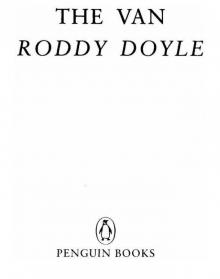 The Van
The Van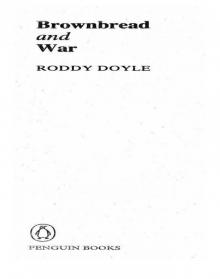 Brownbread & War
Brownbread & War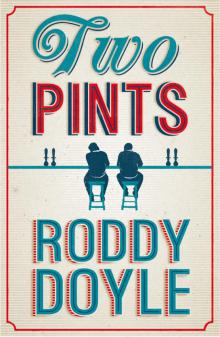 Two Pints: A Collection
Two Pints: A Collection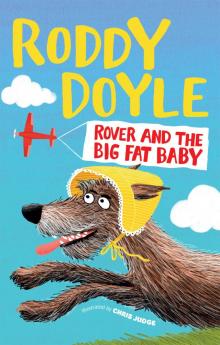 Rover and the Big Fat Baby (Giggler 4)
Rover and the Big Fat Baby (Giggler 4)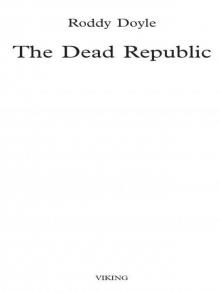 The Dead Republic
The Dead Republic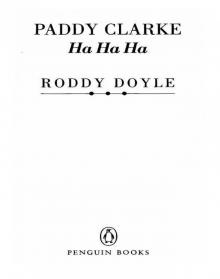 Paddy Clarke Ha Ha Ha
Paddy Clarke Ha Ha Ha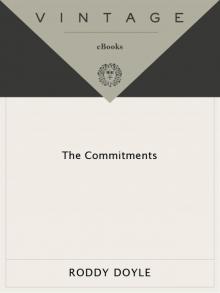 The Commitments
The Commitments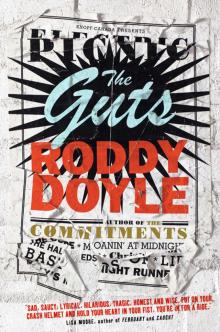 The Guts
The Guts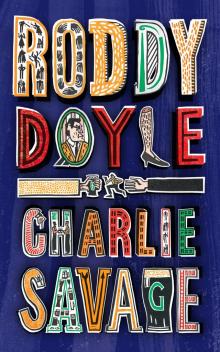 Charlie Savage
Charlie Savage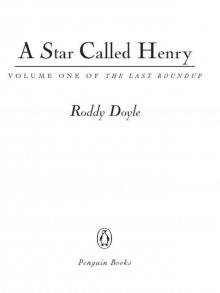 A Star Called Henry
A Star Called Henry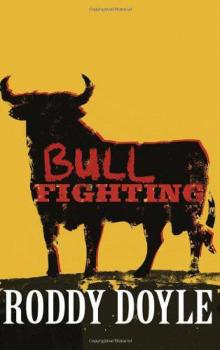 Bullfighting: Stories
Bullfighting: Stories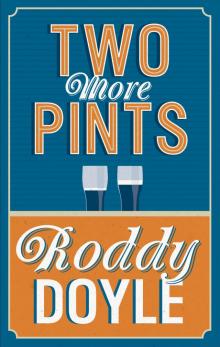 Two More Pints
Two More Pints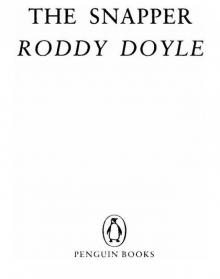 The Snapper
The Snapper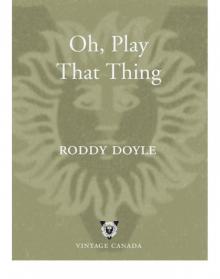 Oh, Play That Thing
Oh, Play That Thing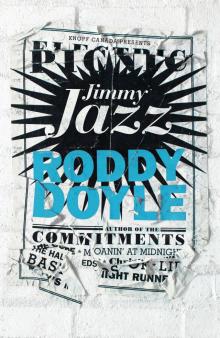 Jimmy Jazz
Jimmy Jazz Paula Spencer
Paula Spencer Wilderness
Wilderness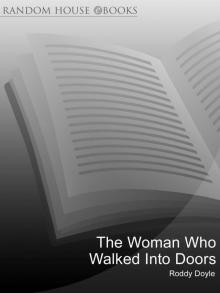 The Woman Who Walked Into Doors
The Woman Who Walked Into Doors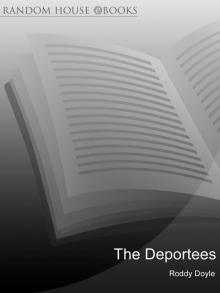 The Deportees
The Deportees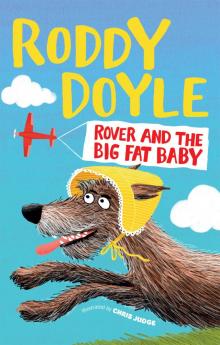 Rover and the Big Fat Baby
Rover and the Big Fat Baby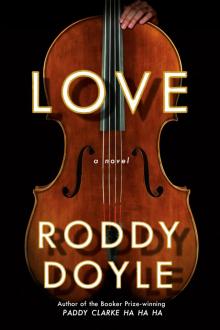 Love
Love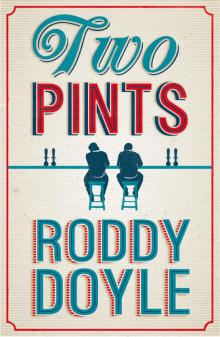 Two Pints
Two Pints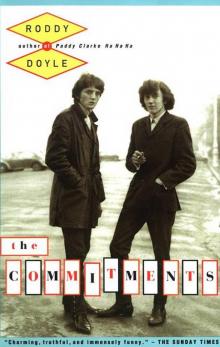 The Commitments b-1
The Commitments b-1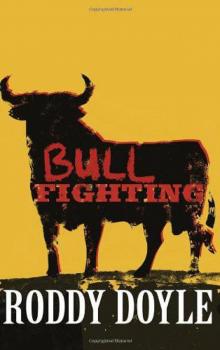 Bullfighting
Bullfighting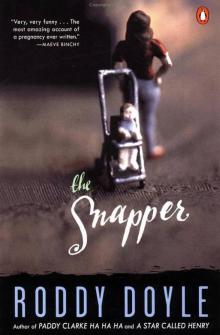 The Snapper b-2
The Snapper b-2